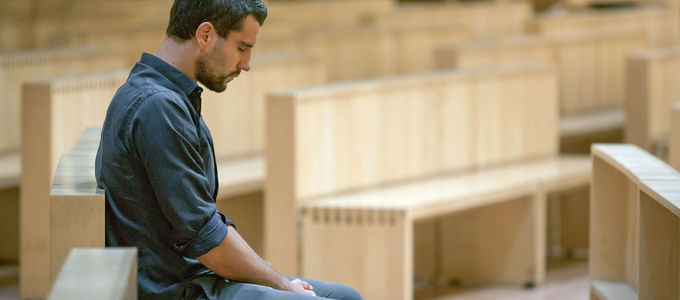What humility means for us today
An apology for past mistakes, an indication to a future without Apostles, and the call to tolerance and respect for our fellow human beings: all of this and more belongs to the concept humility as it is understood by the New Apostolic Church.

Humbleness is not a weakness, but a prerequisite in order to attain divine salvation. This is what Chief Apostle Jean-Luc Schneider makes clear in the latest issue of community. “Thus it seems appropriate to me that we should take a closer look at this term and ask ourselves what it means for us today,” it says in the article.
Humility before God …
… does not imply that we should disdain our own person, the Chief Apostle says. It is more a question of being aware of the perfection and infallibility of God and to recognise that everyone is completely dependent on the grace of God. “Those who are truly humble will bear in mind that God knows them better than they know themselves.”
Humility before our neighbour …
… becomes concrete in two ways. First of all, through tolerance: “He [God] loves our neighbour as He loves us. My neighbour does not have to become like me in order to be loved as I am loved.” Secondly, through thoughtfulness and courtesy: “Nothing prevents us from making decisions in our own interests, provided that these also take the interest of others into account.”
Humility as a servant of God …
… is expressed, for example, in assessing one’s own mandate correctly: “The ministerial mandate only extends to the preaching of the gospel.” Ministers may therefore not invoke their “ministerial authority in order to teach personal experiences of faith as binding.”
Humility before the congregation …
… means that ministers must distinguish between ministerial authority and organisational hierarchy. No minister may abuse his position in order to impose his own advice upon members, even going as far as to imply that their salvation depends on obeying the instructions they have been given.
The humility of the church …
… means knowing one’s own limits: “We do not by any means maintain that our predecessors were infallible,” the Chief Apostle says in looking back on the history of the New Apostolic Church. “The Church apologises for the mistakes that have been made, but we cannot change the past. All we can do is ensure that the mistakes of the past are not repeated, knowing that we will inevitably make others …”
Besides, the fact that we are convinced of our doctrine does not prevent us from acknowledging the spiritual wealth present in other churches or the accomplishments of their members.
And finally, the Apostle ministry and the sacraments will only be required up to the return of Christ, the Chief Apostle says, stating that these are personal reflections, which he does not want to elevate to the level of an inviolable truth. After all, in the thousand-year kingdom of peace, Jesus Himself will be the agent. To still insist that Apostles will still be required then in order to attain salvation would be lacking in respect for Jesus Christ, our Redeemer.
Photo: ZoneCreative - Fotolia
Article info
Author:
Date:
Keywords:
Andreas Rother
04.07.2017
Doctrinal statements,
Doctrinal instruction







